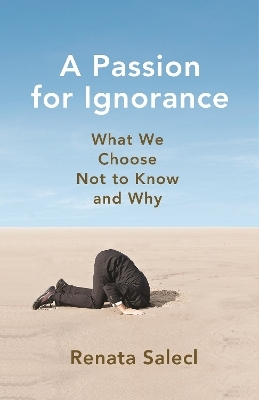
A Passion for Ignorance
What We Choose Not to Know and Why
Seiten
2022
Princeton University Press (Verlag)
978-0-691-24099-2 (ISBN)
Princeton University Press (Verlag)
978-0-691-24099-2 (ISBN)
An original and provocative exploration of our capacity to ignore what is inconvenient or traumatic
Ignorance, whether passive or active, conscious or unconscious, has always been a part of the human condition, Renata Salecl argues. What has changed in our post-truth, postindustrial world is that we often feel overwhelmed by the constant flood of information and misinformation. It sometimes seems impossible to differentiate between truth and falsehood and, as a result, there has been a backlash against the idea of expertise, and a rise in the number of people actively choosing not to know. The dangers of this are obvious, but Salecl challenges our assumptions, arguing that there may also be a positive side to ignorance, and that by addressing the role of ignorance in society, we may also be able to reclaim the role of knowledge.
Drawing on philosophy, social and psychoanalytic theory, popular culture, and her own experience, Salecl explores how the passion for ignorance plays out in many different aspects of life today, from love, illness, trauma, and the fear of failure to genetics, forensic science, big data, and the incel movement—and she concludes that ignorance is a complex phenomenon that can, on occasion, benefit individuals and society as a whole.
The result is a fascinating investigation of how the knowledge economy became an ignorance economy, what it means for us, and what it tells us about the world today.
Ignorance, whether passive or active, conscious or unconscious, has always been a part of the human condition, Renata Salecl argues. What has changed in our post-truth, postindustrial world is that we often feel overwhelmed by the constant flood of information and misinformation. It sometimes seems impossible to differentiate between truth and falsehood and, as a result, there has been a backlash against the idea of expertise, and a rise in the number of people actively choosing not to know. The dangers of this are obvious, but Salecl challenges our assumptions, arguing that there may also be a positive side to ignorance, and that by addressing the role of ignorance in society, we may also be able to reclaim the role of knowledge.
Drawing on philosophy, social and psychoanalytic theory, popular culture, and her own experience, Salecl explores how the passion for ignorance plays out in many different aspects of life today, from love, illness, trauma, and the fear of failure to genetics, forensic science, big data, and the incel movement—and she concludes that ignorance is a complex phenomenon that can, on occasion, benefit individuals and society as a whole.
The result is a fascinating investigation of how the knowledge economy became an ignorance economy, what it means for us, and what it tells us about the world today.
Renata Salecl, a philosopher and sociologist, is professor at the School of Law at Birkbeck College, University of London and senior researcher at the Institute of Criminology at the Faculty of Law in Ljubljana, Slovenia. Her books include The Tyranny of Choice and On Anxiety.
| Erscheinungsdatum | 01.11.2022 |
|---|---|
| Verlagsort | New Jersey |
| Sprache | englisch |
| Maße | 140 x 216 mm |
| Themenwelt | Geisteswissenschaften ► Philosophie ► Erkenntnistheorie / Wissenschaftstheorie |
| Geisteswissenschaften ► Psychologie ► Sozialpsychologie | |
| ISBN-10 | 0-691-24099-X / 069124099X |
| ISBN-13 | 978-0-691-24099-2 / 9780691240992 |
| Zustand | Neuware |
| Informationen gemäß Produktsicherheitsverordnung (GPSR) | |
| Haben Sie eine Frage zum Produkt? |
Mehr entdecken
aus dem Bereich
aus dem Bereich
die Grundlegung der modernen Philosophie
Buch | Softcover (2023)
C.H.Beck (Verlag)
18,00 €
Buch | Softcover (2023)
Reclam, Philipp (Verlag)
7,00 €

![Was heißt Denken?. Vorlesung Wintersemester 1951/52. [Was bedeutet das alles?] - Martin Heidegger](/media/113619842)
